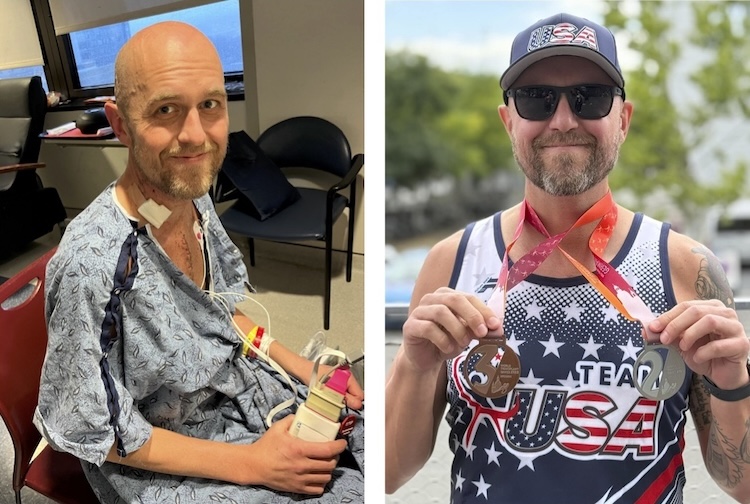Successful transplant of hepatitis C kidneys enables more patients to get organs
Hume-Lee research responsible for new protocol, which expands number of kidneys available for transplant.
October 29, 2021 Kidney transplant surgery taking place at Hume-Lee Transplant Center (Allen Jones, University Marketing)
Kidney transplant surgery taking place at Hume-Lee Transplant Center (Allen Jones, University Marketing)
By Jeff Kelley
VCU Health's Hume-Lee Transplant Center is committed to saving as many lives as possible each year. That's no easy task amid a national organ shortage. In a nation with more than 100,000 people on the kidney waiting list, 12 people die each day waiting for a transplant.
So for several years, transplant researchers at Virginia Commonwealth University have studied a unique process that allows transplant teams to safely and effectively transplant kidneys from hepatitis C-positive deceased donors into recipients who do not have hepatitis C. Under these protocols, there is an extremely low chance — just 3% — of transferring hepatitis C to the recipient. And, there are more organs available for transplant.
New life for kidneys that are often discarded
Traditionally, kidneys from hepatitis C-positive patients have been discarded to avoid transmitting hepatitis C to the transplant recipient. Now that there is a treatment for hepatitis C, some transplant centers do use these kidneys. After transplant, they immediately treat recipients with eight to 12 weeks of anti-viral drugs to eradicate the disease, which is transmitted with the new kidney.
In contrast, at VCU Health Hume-Lee Transplant Center, recipients receive the anti-hepatitis drugs prior to surgery, rather than afterwards. The thinking: prevent transplant recipients from getting hepatitis C in the first place.
Since the initial yearlong trial in 2018, Hume-Lee has successfully transplanted more than 150 kidneys from hepatitis C-positive donors without transferring chronic hepatitis C to the recipients.
“We can reassure patients that there is a very low likelihood they will ever get hepatitis C,” Gupta said. “That helps a lot on the emotional side because most families, particularly spouses, are very concerned that their loved one will get the infection.”
Added bonus — cost savings
An additional bonus to treating patients for hepatitis C before they receive a hepatitis C organ is cost savings. Treating transplant patients who acquire hepatitis C is expensive. The anti-viral drugs cost about $26,000 or more per patient, and often trigger delays or denials in insurance coverage.
Treating transplant recipients beforehand, thereby avoiding transmission, is cheaper. Just $3,000, according to VCU-led research under peer review.
“In effect, using our strategy for the last 100 transplants has resulted in a cost savings of $2.3 million to payers,” said Gaurav Gupta, M.D., Hume-Lee's medical director of kidney transplantation and a lead author on the research series.
Opioid overdoses — a bittersweet source of donor organs
The increased supply of donor organs from hepatitis C patients is driven in part by the opioid epidemic, Gupta said. Overdoses cause deaths in an otherwise healthy person, whose organs would generally be considered safe for transplant. Sharing needles, though, can transmit hepatitis C.
“There's sadly been a huge surge of organs — lungs, hearts, livers, kidneys — that have become available for transplant due to the opioid pandemic,” Gupta said.
Currently, researchers are looking at ways to change preventative drugs to drop the risk of transmission to zero. Gupta is also looking at long-term outcomes to understand whether there are any consequences to the treatment. “We don't believe so,” he said. “But that's what we do in science — measure things that may not have been accounted for before.”
New protocols benefit underserved communities
The VCU research, funded by the VCU Presidential Research Quest Fund, VCU Health Pharmacy Services and Gilead pharmaceuticals, is also improving care and addressing social inequities: most kidney transplants at VCU are performed on African American and Latino recipients; a number are low income. Both groups are multiple times more likely to experience kidney failure than whites.
“Essentially the bulk of these hepatitis C transplants at VCU are going to historically disadvantaged populations and providing them very good outcomes,” Gupta said. “From both a cost and care perspective, this research has helped us serve minority communities a lot more than we would have been able to in the past.”
For more information about kidney transplantation at VCU Health Hume-Lee Transplant Center, visit vcuhealth.org/transplant.
Sign Up for Transplant E-Newsletter




